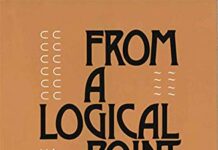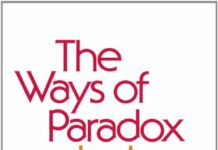
Ebook Info
- Published: 1981
- Number of pages: 364 pages
- Format: PDF
- File Size: 10.36 MB
- Authors: Willard Van Orman Quine
Description
W. V. Quine’s systematic development of mathematical logic has been widely praised for the new material presented and for the clarity of its exposition. This revised edition, in which the minor inconsistencies observed since its first publication have been eliminated, will be welcomed by all students and teachers in mathematics and philosophy who are seriously concerned with modern logic.Max Black, in Mind, has said of this book, “It will serve the purpose of inculcating, by precept and example, standards of clarity and precision which are, even in formal logic, more often pursued than achieved.”
User’s Reviews
Editorial Reviews: Review “Every section of this book provides evidence of rare skill, both in research and communication; it deserves to be read and read again by all who have a serious interest in mathematical logic.”―Max Black, Mind“Combines exemplary clarity and precision with an unusual vividness and originality in style which actually makes the study of the work a fascinating adventure.”―Carl G. Hempel, Philosophic Abstracts“An excellent systematic presentation of mathematical logic… Because it is a clear, exact, and exhaustive treatment of the subject, Professor Quine’s book should serve well as a text in a course on mathematical logic.”―Morton G. White, Philosophical Review About the Author W. V. Quine was Edgar Pierce Professor of Philosophy, Harvard University. He wrote twenty-one books, thirteen of them published by Harvard University Press.
Reviews from Amazon users which were colected at the time this book was published on the website:
⭐Quine’s approach to logic and set theory was on an evolutionary branch which was doomed to extinction. The Whitehead/Russell style of logic and its clumsy notation were destined to become footnotes in history, although Quine may have only dimly sensed this at the time. So this 1940/1951 book is on an essentially extinct branch of mathematical logic, now known only as fossils in museums.The “quasi-quotation” notation in pages 33-37 seems to be a Quine innovation, designed to keep deduction lines shorter by using pointers to stretches of text, which you must then look up by number. The dot-notation on pages 37-42 seems to be inherited from Frege via Whitehead/Russell. Various other authors in Quine’s time used incompatible variations of this notation. So there is no one single dot-notation convention. Together, these two notational conventions make this book almost as incomprehensible as Frege’s diagrams, which I call “quipu notation”.Regarding the substance of this book, it isn’t really of great interest any more. The preoccupations of that time have come and gone. Ever since the independence proofs of
⭐in 1963, concerns about the foundations of mathematical logic have been relegated to the model theory department, where mathematicians don’t need to think about them any more. The work of Frege, Whitehead/Russell, Hilbert, Gödel, etc., is now studied in the history and palaeontology departments. Nowadays we have first-order languages, ZF and model theory. Logicism in its original form lost the argument. The new logicism is FOL, model theory, ZF set theory etc.On the positive side, this book does pay close attention to the linguistic aspects of logic in pages 1-115. In later decades, these were more compactly formulated as FOL rules and axioms. The approach to classes and relations in this book was likewise incorporated into the FOL formalism.All in all, this book does have some “archaeological” interest, but is unsuitable for the modern world. As always, however, I am grateful to enlightened publishers for keeping the old books alive. In mathematics, semi-abandoned ideas have a habit of resurfacing many decades or centuries later to become the new, modern advanced ways of doing things.
⭐I don’t think I can even begin judging the brilliant work by Quine! A student of A. N. Whitehead he wrote this book to summarize what aspects of the Principia he thought remained standing after the attacks by Godel, and the works of Tarski and Hilbert. It is a fantastic book and Quine is a brilliant writer, even if he moves at a fast pace. The first chapter will give you the notation he uses, the truth-tables, and some introduction and then Quine will jump into his theorems, building one on another. This book also has a special Summation-1 proof of the Incompleteness theorem that Quine himself developed.So I can only really appraise the edition, and the truth is that it could be much, much better. The pages are glued together in a binding which is prone to curling up; there are some pages with some small misprints (nothing that can’t be easily picked up), and the ink looks a weirdly shiny way. The book is also rather small to use as a logical textbook, and people trying to write whilst reading (to reproduce the proof) will have some difficulty.Even then, I cannot more highly recommend this controversial but still brilliant book by Quine. Whether or not you buy into his view of logic (opposed to that of Boolos) no one can claim that he wasn’t a beautiful arguer, and more importantly a story-teller. So buy this book and let Quine tell you the story of Maths, Logic, and everything in between!
⭐I have been reading this book off and on for years. It is beautiful. However, I am not well read in mathematical logic, and the comments of a mathematical logician as to whether the proofs are correct and what should be read next would be helpful to readers interested in mathematical logic. I read the book to understand Godel. There are better books for that. However, once I starting reading this book, I appreciated the eloquence of Prof. Quine and the beauty of the axioms, definitions and proofs in the book.
⭐This book is indeed much shorter than Principia, mainly because it is derived for lecture notes for a 1 semester PhD course. It is also a lot clearer than PM. But the notation is largely the same, which makes for hard reading if your are under 50. Quine’s proof format doesn’t take up much space, but has always eluded me. This book contains the best treatment of truth functional and quantificational logic prior to natural deduction and truth trees.I like the set theory of this book, but I warn you that it is very nonstandard. Even ardent lovers of Quine’s NF theory hatethe ML theory of this book.The weakness of this book is its treatment of metatheory:consistency, completeness, decidability, categoricity. The treatment of Godel’s incompleteness is detailed and highly original (altho’ it owes more to Tarski than to Godel). But it is very difficult, and Smullyan (1991) is much better.Quine also had no clue re model theory or recursion.I respect the historical remarks a lot. Just one big omission: Quine, like nearly everyone of his generation, missed thatmath logic as we know and love it does not descend from Frege, but from an 1885 article by C S Peirce.
⭐Be warned, nobody should buy the Literary Licencing 2011 hardback edition of Quine’s Mathematical Logic unless they are directly interested in the system which was presented in the first edition of the work and was subsequently proved to be contradictory by Rosser. Those who are interested in Quine’s final ML system, which outstrips the more usual ZF set theory in power and is provably consistent if his earlier and more widely investigated NF system is, will undoubtedly want the later revised edition of 1951 or, much better, the final edition with the 1981 preface. This edition is only of interest to those concerned primarily with the historical development of the ML system and is a misleading purchase for those who wish to use it as an actual logical tool. There is no doubt that Quine would have burnt all copies of the first edition if he could and it is not right to sell them without some indication of the exact edition that the purchaser is getting.
⭐a must for students of logic
Keywords
Free Download Mathematical Logic: Revised Edition in PDF format
Mathematical Logic: Revised Edition PDF Free Download
Download Mathematical Logic: Revised Edition 1981 PDF Free
Mathematical Logic: Revised Edition 1981 PDF Free Download
Download Mathematical Logic: Revised Edition PDF
Free Download Ebook Mathematical Logic: Revised Edition



